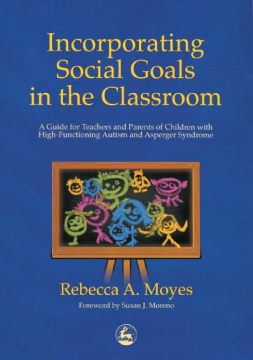
Additional Information
Book Details
Abstract
This book provides practical, hands-on strategies to teach social skills to children with high-functioning autism and Asperger Syndrome. It includes a detailed description of the social deficits of these children as they appear in the classroom - difficulties with such things as understanding idioms, taking turns in conversation, understanding and using tone of voice and body language - and ways to address them. Instruction is included in the book to enhance the development of appropriate, measurable, and meaningful individualized education plans (IEPs) to incorporate social goals. Lesson plans are included to facilitate the ability to 'teach' these social goals. Parents will find this text an excellent training tool to help develop social education curriculums for their children, and teachers will find it particularly helpful as an easy-to-read manual containing many 'nuts and bolts' strategies to utilize in the classroom.
This book does exactly what it says on the cover; 'provides practical, hands-on strategies to teach social skills to children with high-functioning autism and Asperger's syndrome'. It seems to encompass what a lot of teachers have been asking for. Indeed, whilst reviewing the book, it has been recommended and lent out to various colleagues and practitioners with a lot of positive feedback... this book will be a highly valuable resource. It can, very easily, be 'dipped into' for looking for certain areas. It is likely to be useful to educational psychologists as a reference, and to staff and parents.
Debate
Incorporating Social Goals in the Classroom is an extremely useful guide for parents and teachers of children with Asperger Syndrome, Alongside some comprehensive information about the condition, Moyes includes a wealth of examples to illustrate her approach. Her first-hand experience as a mother of a son with high-functioning Autism/Asperger Syndrome shows in her well researched but practical examples of inclusive activities (including skill-streaming). The importance of parents as integral activists in the education of their SEN children is central to the book and there is a good balance between theory and practice. The chapter on Individual Education Plans (IEPs) is the most useful for all non-specialists and parents.
Child Education
a fascinating book, interesting, stimulating and would be of use to any teacher or learning support assistant who is working with a child who has Asperger syndrome in their class. The interventions are described well in terms that inspire one to use them. Some of the interventions are well known, others are less so and all are backed by research evidence on the effectiveness of the programmes. I would recommend this text to teachers, educational psychologists, and learning support assistants.
British Journal of Educational Psychology
Rebecca Moyes worked in collaboration with Children's Hospital of Pittsburgh, Pennsylvania to establish the Advisory Board on Autism and Related Disorders. This organization provides information and support to families of children with autism and the professionals who work with them in the Pittsburgh area. She served as the organization's principal officer for over five years. Her oldest child was diagnosed with Asperger Syndrome eight years ago. Mrs Moyes is a former teacher, and today works as an educational consultant for children with autism spectrum disorders. She produces a quarterly newsletter entitled Building Bridges for teachers and parents of children with this diagnosis.
Like many experts in the field of autism and Asperger Syndrome, Rebecca Moyes has a child with the diagnosis. As a teacher who was driven by necessity to learn how to cope with her son's issues, she shares her hard-won expertise in Incorporating Social Goals in the Classroom, an excellent how-to manual for teachers and parents of children with autistic disorders.
Metapsychology
I think you are in for quite a treat in reading this book and keeping it on hand as a reference. It is well-organized. The reader can locate a topic and study it briefly or deeply, according to available time and need. Most importantly for both parents and teachers, this book won't waste your time. Parents and professionals share a need for practical, rather than theoretical, advice. This book provides just that. I was so taken with the good, creative information in this book that I have already asked Rebecca to present at my next conference. May Rebecca's book ease your educational burdens, as she has done for the fortunate families she has known since her child was diagnosed.
from the Foreword by Susan J Moreno, President and Founder of MAAP Services, Editor of The MAAP, and parent
Parents who have children that are considered higher functioning on the Autistic Spectrum and those who have Asperger Syndrome will benefit greatly from utilizing the resources within Incorporating Social Goals in the Classroom. Therapists that teach social skills training groups would gain further insights into the classroom issues their students face and can incorporate the checklists and examples in their therapies.
BellaOnline Reviews
